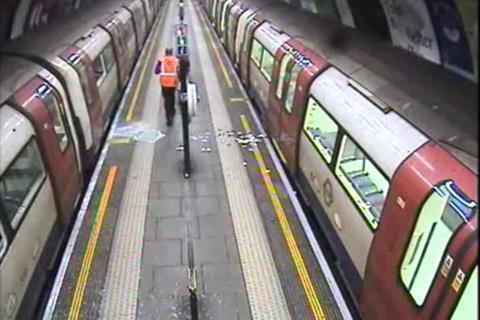
UK: The Rail Accident Investigation Branch makes three recommendations to London Underground in its report into the uncontrolled evacuation of a train at Clapham Common station.
On May 5 2023 a Northern Line train came to a stand with two cars inside the tunnel and four cars adjacent to the platform after the passenger emergency alarm was activated when smoke and a smell of burning entered the train.
The doors remained closed, and around 100 of the 500 passengers self-evacuated onto the platform through the interconnecting doors and the windows, some of which were broken by passengers inside or on the platform. Station staff began opening the doors around 4½ min after the train came to a stand.
RAIB found that passengers perceived a significant risk from fire, and became increasingly alarmed when the doors remained closed and they did not receive suitable information or see any effective action from staff.
The incident resulted in minor injuries, but RAIB says it had the potential to have been more serious.
Recommendations
The first recommendation relates to procedures and training to ensure that staff have clear guidance on how to deal with out-of-course events. Transport for London has reviewed train operator and station staff training, and the incident is to be included in training material by the end of May.
The second relates to learning from previous incidents not being lost and recommendations being tracked through to implementation. TfL’s internal investigation reports and audit actions are now kept in perpetuity, rather than the previously agreed seven years.
The third recommendation is that London Underground reviews its risk assessment processes so that the risks associated with out-of-course events and at specific locations are effectively identified and assessed. The risk assessments for island platforms have been updated and further consideration will be given to other types of out-of-course events.
Responses
Commenting on the report published on May 8, Chief Inspector of Rail Accidents Andrew Hall said ’staff didn’t fully appreciate the emerging safety risk when passengers’ behaviour began to escalate as they became increasingly anxious. When passengers did not receive suitable information about the nature of the incident and the actions they should take, nor see action they would have expected to be taken, they turned to desperate measures to self-evacuate.
‘RAIB investigated a similar incident at Holland Park in 2013 and for a number of years that incident was used as an example to train staff about how to respond to such out-of-course events. However, it was subsequently removed from the training syllabus and since then knowledge of the lessons learnt may well have begun to fade. This incident again demonstrates that learning from past operational incidents needs to be retained by organisations.’
In response to the report, London Underground’s Director of Customer Operations Nick Dent said ‘we welcome any opportunities to learn lessons from incidents on our network and, following our own investigation last year, we are already making good progress on the recommendations’.

















